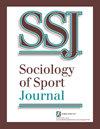A Baltimore Benevolence Thing? American Philanthropy, Neoliberal Fitness, and the Persistence of “Colorblind” Racial Silencing
IF 2.2
3区 教育学
Q2 HOSPITALITY, LEISURE, SPORT & TOURISM
引用次数: 2
Abstract
Drawing upon 3 years of fieldwork with a nonprofit fitness education development program targeting “at-risk” Baltimore youth, this article examines pedagogical barriers rooted in the perceived, and materially experienced, differences of race, gender, class, and culture. Set within the confines of increasingly privatized spaces of fitness/health in a starkly divided Baltimore, MD, this study demonstrated how interventions were rooted in a self-congratulatory and neocolonial benevolence—steeped in a largely unacknowledged form of neoliberal individualism—which routinely denied and silenced impacts of racism. Observations of instructor–student interaction revealed substantial disconnects concerning definitions of the body, fitness, and significance of race in health disparities, resulting in student refusal and program cessation. Given the power dynamics between white fitness-philanthropists and Black youth, the author, as active participant–observer, occupied a liminal space where considerations of authenticity and immersion became critical.巴尔的摩的慈善活动?美国的慈善事业,新自由主义的适应性,以及“色盲”种族沉默的持续
通过3年针对巴尔的摩“高危”青少年的非营利性健身教育发展项目的实地考察,本文考察了根植于感知和物质体验的、种族、性别、阶级和文化差异的教学障碍。该研究以马里兰州巴尔的摩日益私有化的健身/健康空间为背景,展示了干预是如何根植于一种自我祝贺和新殖民主义的仁慈——沉浸在一种很大程度上未被承认的新自由主义个人主义形式中——这种形式经常否认和沉默种族主义的影响。对师生互动的观察显示,有关身体、健康和种族在健康差异中的重要性的定义存在实质性脱节,导致学生拒绝和项目终止。考虑到白人健身慈善家和黑人青年之间的权力动态,作者作为积极的参与者和观察者,占据了一个有限的空间,在这里,真实性和沉浸性的考虑变得至关重要。
本文章由计算机程序翻译,如有差异,请以英文原文为准。
求助全文
约1分钟内获得全文
求助全文
来源期刊

Sociology of Sport Journal
社会科学-运动科学
CiteScore
3.00
自引率
29.40%
发文量
51
审稿时长
>12 weeks
期刊介绍:
Published four times a year (March, June, September, December), the Sociology of Sport Journal (SSJ) publishes original research, framed by social theory, on exercise, sport, physical culture, and the (physically active) body. Analyses from diverse theoretical and methodological perspectives are encouraged to stimulate further research, critical thought, and theory development on topics ranging in broad scope from global professional sport, coaching, commercial exercise/fitness, and recreational physical activity. The journal publishes an array of peer-reviewed research articles, research notes, and book reviews. Members of the North American Society for the Sociology of Sport (NASSS) receive SSJ as part of their membership.
 求助内容:
求助内容: 应助结果提醒方式:
应助结果提醒方式:


